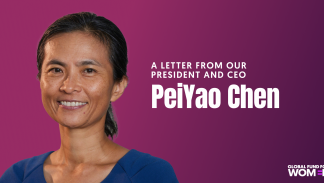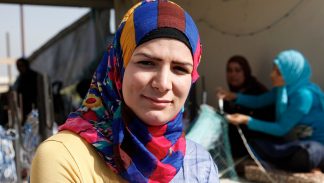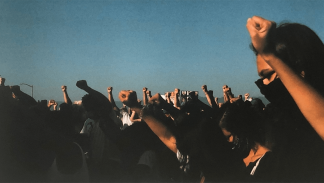Forces United for Our Disappeared in Coahuila and Mexico
Soon after then-president Felipe Calderon declared the war on drugs in Mexico in late 2006, human rights organizations began noticing an alarming trend. Alongside the soaring homicide rates, people were disappearing. Sons were abducted from their homes; fathers vanished on the highways; daughters never made it home from school. The police—either complicit with the criminals, insensitive, guilty, or afraid—often refused to even investigate. Driven by grief, families began desperate quests to find their loved ones.
In the hard-hit border state of Coahuila, the Juan de Larios Diocesan Center for Human Rights began to register cases and provide services to relatives of the disappeared. On December 19, 2009, families linked by the Center created Forces United for Our Disappeared. They started with cases of disappearances in the state of Coahuila and a year later went nationwide.
“We believe that you have to conquer your rights and defend them—nobody else will defend our rights if we don’t defend them. And that defense has to be collective,” explains Blanca Martinez, director of the Center. For Angeles Mendieta, whose son was disappeared in Coahuila in 2011, the organization has made a huge difference. “We went to the bar where my son disappeared and they slammed the door in our face,” she recalls in a choked voice. “But being part of the organization has opened doors.” As well as searching for the members’ missing relatives, Forces United has gained access to government officials at all levels, passed laws to protect the rights of families of the disappeared, and holds monthly meetings with the governor.
The organization is also a way to channel pain into action. “Since I began in FUNDEM I’ve tried to participate in everything, every event I’m invited to,” Angeles says. “Because that’s the only way to find a little peace in my heart.”
Although Forces United wasn’t formed as a women’s group, over 90% of its members are women. The mother-child bond makes women “tireless warriors”—in Angeles’ words—in searching for their sons and daughters. “You become a human rights defender without realizing it, carried by your instinct as a mother, your instinct to protect and shelter,” Yolanda Moran, the organization’s Coordinator for the Central Region, explains. She’s a perfect example. Since her son disappeared in Torreon, Yolanda has marched in the streets, crisscrossed the country from government office to downtown demonstration, and even confronted the President.
It was the mothers of Forces United who changed the meaning of Mothers’ Day in Mexico forever. For five years running, mothers across the country have marched through the capital with banners bearing the faces of their missing children and the facts of their disappearance—a space known as Marcha de las Madres or the Mother’s March. “We created the Mothers’ Day demonstrations because, for us, there’s nothing to celebrate on May 10. The person to give us that hug is missing. So instead on May 10 we go out to demand that the government search for our children,” says Yolanda.
Their work entails risk. Two of the defenders who confronted President Felipe Calderon in a televised meeting alongside Yolanda have been assassinated. Yolanda, whose son was kidnapped by a group of soldiers and former military officers, fled Mexico City after receiving death threats and on the recommendation of the military official charged with the case. She has received threatening calls and paid ransoms to extortionists on the off-chance that one will return her son to her. “I have to leave my fear at home. I am afraid, afraid for my children, but with fear you don’t do anything, it can paralyze you,” says Yolanda. “And I have to keep on going–speaking out, attending events and marches.” The defenders in Forces United have found that organization can be the best form of protection. Families under threat report that intimidation decreases after joining the organization, particularly from government and security forces.
For the mothers of Forces United, their personal grief has become a collective mission. Says Angeles, “This movement that we’ve built is based on unity. We no longer search for one; we search for all. And we search for justice and we search for truth.”
#DearDefendHer
Show FUNDEM and other women human rights defenders around the world that you stand with them! Sign our #DearDefendHer solidarity statement today.
We believe that you have to conquer your rights and defend them—nobody else will defend our rights if we don’t defend them."Blanca Martinez


